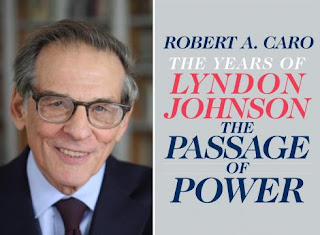THE PASSAGE OF POWER PDF Download. Follow the Download Link
Caro's series on Johnson is the best biography I've ever read because Caro knows his man, captures him in all his complexity, and uses his subject to explore the larger issue of how political power is wielded in the U.S.
Some critics have claimed that Caro oscillates between portraying the "good" Johnson and the "bad" Johnson -- and that in the current volume the "good" Johnson takes over. This is not a fair reading of the book. Caro is simply willing to give Johnson his due when he uses power for worthy causes. Johnson's self control and consolidation of power after the Kennedy assassination and his skill in passing Kennedy's tax cut and civil rights act -- which Kennedy probably would not have been able to pass -- are admirable. Johnson's motivation is explained in part by self interest -- the man loves power, and doing great things makes one even more powerful. The whole idea of separation of powers and checks and balances is to let ambitious men make their mark without consolidating too much power. The public can benefit from such ambitious leaders. Part of Johnson's motives were personal and moral -- he identified with the dispossessed given his upbringing and history. These very different kinds of motivations can and do coexist in the same individual.
Thirty years have passed sine the publication of The Path to Power, the first of what Robert Caro had envisioned would be a three-volume biography of America's 36th president. This, his fourth volume, ends in the first months of Johnson's presidency, and Caro's assertion that this is the penultimate volume is a little hard to swallow given the thoroughness he has covered his subject's life even before reaching his time in the White House (with a third of this book's 700+ pages chronicling just the first four months as president). Yet Caro has sacrificed brevity for a detailed portrait of irony in his depiction of a master of political power who suddenly found himself deprived of it.
Caro begins with Johnson at the height of his success in the Senate. Still only in his second term, he had taken the weak position of Senate Majority Leader and turned it into the second most powerful office in national politics, thanks largely to his enormous personal and legislative abilities. But Johnson had his eye on an even larger prize: the presidency itself, an office he had aspired to for decades and which in 1960 seemed to many to be his for the taking. Yet Johnson hesitated to commit himself to the race, fearing the humiliation of a defeat. This created an opening that John F. Kennedy eagerly exploited. With his brother Robert collecting commitments in the west - a region critical to Johnson's chances - Kennedy outmaneuvered the Texas senator and won the nomination, demonstrating just how completely Johnson had misjudged his opponent.

No comments:
Post a Comment